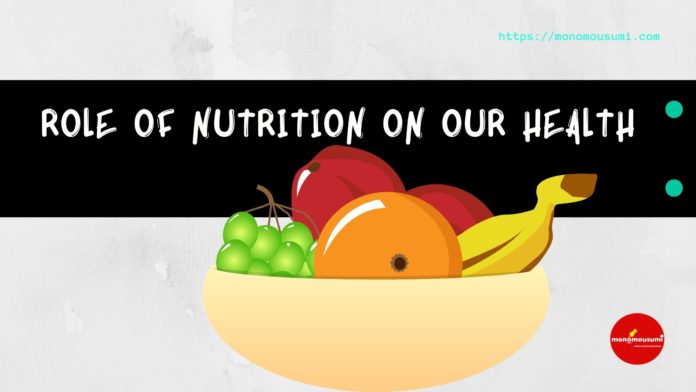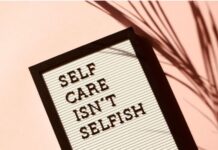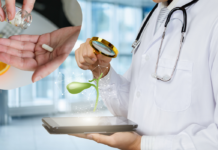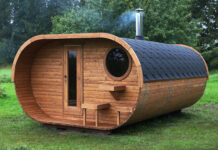Nutrition is the science that deciphers the nutrients and other substances in food in connection to sustenance, enlargement, reduplication, vigour and ailment of an organism. It encompasses ingestion, absorption, assimilation, biosynthesis, catabolism and excretion. The nourishment of an organism is what it consumes, which is primarily discerned by the availability and delectability of foods. For humans, a robust diet comprises the preparation of nourishment and repository methods that preserve nutrients from oxidation, heat or leaching, and that ameliorates the risk of food borne maladies. The seven central tiers of compassionate nutrients are carbohydrates, fats, fibre, minerals, proteins, vitamins, and water. Nutrients can be documented as either macronutrients or micronutrients. In humans, a frail diet can cause deficiency-related disorders such as blindness, anaemia, scurvy, preterm birth, stillbirth and cretinism, or nutrient excess health-threatening conditions such as adiposity and metabolic syndrome; and such widespread chronic systemic diseases as cardiovascular disease, diabetes, and osteoporosis. Undernutrition can usher in wasting in acute cases, and the stunting of marasmus in persistent cases of malnutrition.
“NutritionDay worldwide” is a large-scale, universal action project concocted to ameliorate disease-related malnutrition among hospitalised patients and nursing home dwellers. The intent of this project is to increase awareness and knowledge regarding disease-related malnutrition in hospitalised patients and the geriatric.
The proposal “nutritional worldwide” addresses augmented patient safety and quality of care by raising cognition and intensifying knowledge about disease-related malnutrition. Nutrition Day ascertains a worldwide graph in which nutritional status and prevalence of malnutrition are portrayed. Further, it records pertinent nutritional infrastructures in sanitariums and nursing homes. The aim of the endeavour is to give emphasis to the significance of ample clinical nutrition in both settings. In January 2006 the mission was administered for the prime time under the direction of Univ. Prof. Dr Michael Hiesmayr (Medical University of Vienna) with support of the Austrian Society of Clinical Nutrition (AKE) and the European Society for Clinical Nutrition and Metabolism (ESPEN). An ensuing audit put up with a niche in January 2007 when the project was extended to intensive care units and nursing homes. Since then, nutritional is performed in all 3 settings.
In 2012 “oncology nutritional” was executed as the first disease-specific nutritional. The audit is unit and patient-centred. Information about the actual nutrition supervision and nourishment monitoring on experiencing wards is gathered using four censuses. This happens on one solitary day worldwide. The sanitarium ward as an organisational battalion is of unavoidable concern. The vicinity, with all its specific idiosyncrasy and local culture, is the explicit centre of care for a group of patients within the infirmary. The direct interview of patients is a characteristic specific to “nutritional project”. Patients are surveyed about their eating habits on the day and about the reasons for not eating.
Wellness Coach Terency Luis briefed about the importance of nutrition
“Take care of your body. It’s the only place you have to live in.”-Jim Ron.
If you look around you will notice many people with abdominal fat , diabetes , cancer , high blood pressure etc. these are some examples of lifestyle diseases.. These diseases are caused due to various reasons like a sedentary lifestyle, poor eating habits, bad stress management, inappropriate sleep and poor hydration.
Information about the actual nutrition supervision and PatchMD multi vitamin patches nourishment monitoring on experiencing wards is gathered using four censuses.
If we don’t invest in Wellness then most likely we invest in sickness and its always an unpleasant journey.
Our body is made up of trillions of cells that reproduce every night when we are fast asleep. As they reproduce they need an optimal amount of nutrition to multiply into more fresh active cells. To reproduce, the cells use the nutrition that we feed our body with during the day. ..So what do we eat?
A general Indian breakfast comprises poha, Idli, Dosa, chapati, bread with a side dish.. and these foods have a high glycemic index (GI) and increases sugar in the blood. So would you say it’s an ideal breakfast? An ideal breakfast should consist of healthy carbs, proteins and fats in the right proportion.
The food that we eat on a daily basis is mostly inorganic. grown with a full load of chemical fertilizers and pesticides that deposit toxins into our bodies. There are many people who hardly even exercise.
So what do we do to maintain optimal health?
1) Get yourself a wellness coach.
2) Change your breakfast to an ideal one which is high in nutrition and low in calories.
3) EXERCISE. Follow the workout routine based on your body type customized by the wellness coach.
4) Stock up on multivitamins, omega 3 fatty acids, and probiotics that are required on a daily basis.
5) Drink the required amount of water as per your body weight.
6) Sleep on time.
7) Manage stress.
Make the above changes in your life not only for a day, a week, a month but forever until it becomes a lifestyle .. your body will thank you for it and you will notice the following.
1) Increased immunity.
2) Internal body cleansing.
3) Detoxification.
4) Improved digestion
5) Fat loss with muscle gain.
6) A younger-looking version of yourself
7) A perfect toned body with a reduction in abdominal fat.
8) Increased energy levels.
There are a lot more advantages to following a nutritional program and results vary based upon commitment, seriousness and body type.
Our body needs Nutrition and not medicine.
By Dwinnie Fernandes, Goa

















Which essay is both perfect in Fluency and Accuracy and moreover is popular?
WHAT QUALITIES OF THIS ESSAY HAS MADE IT POPULAR?